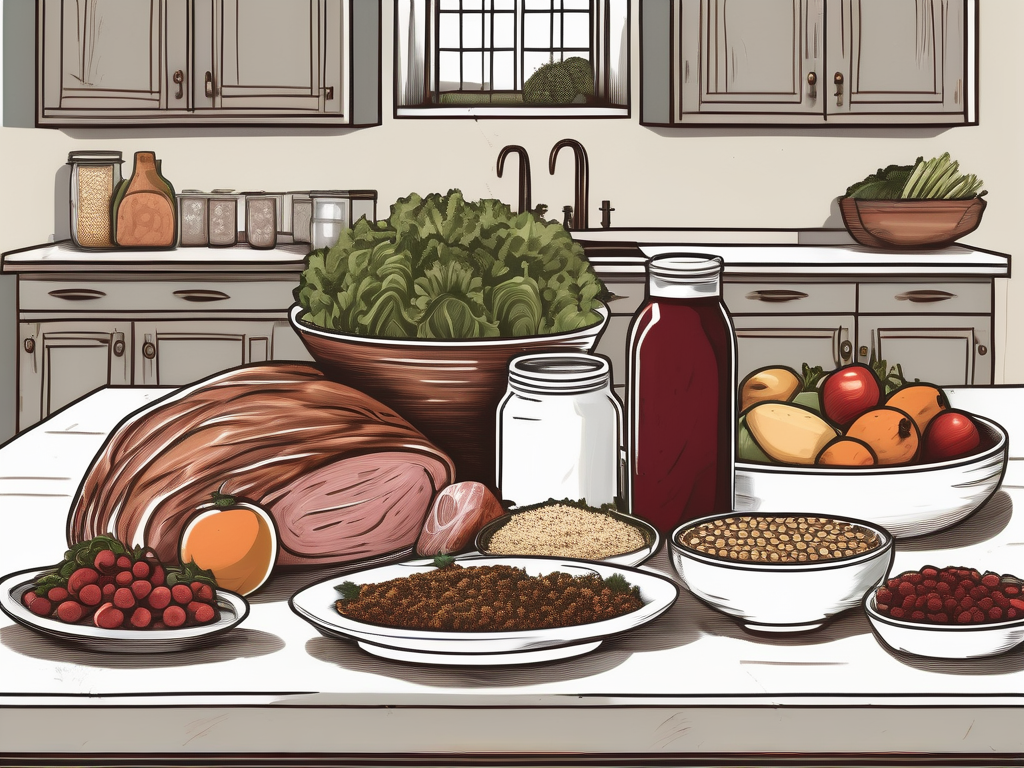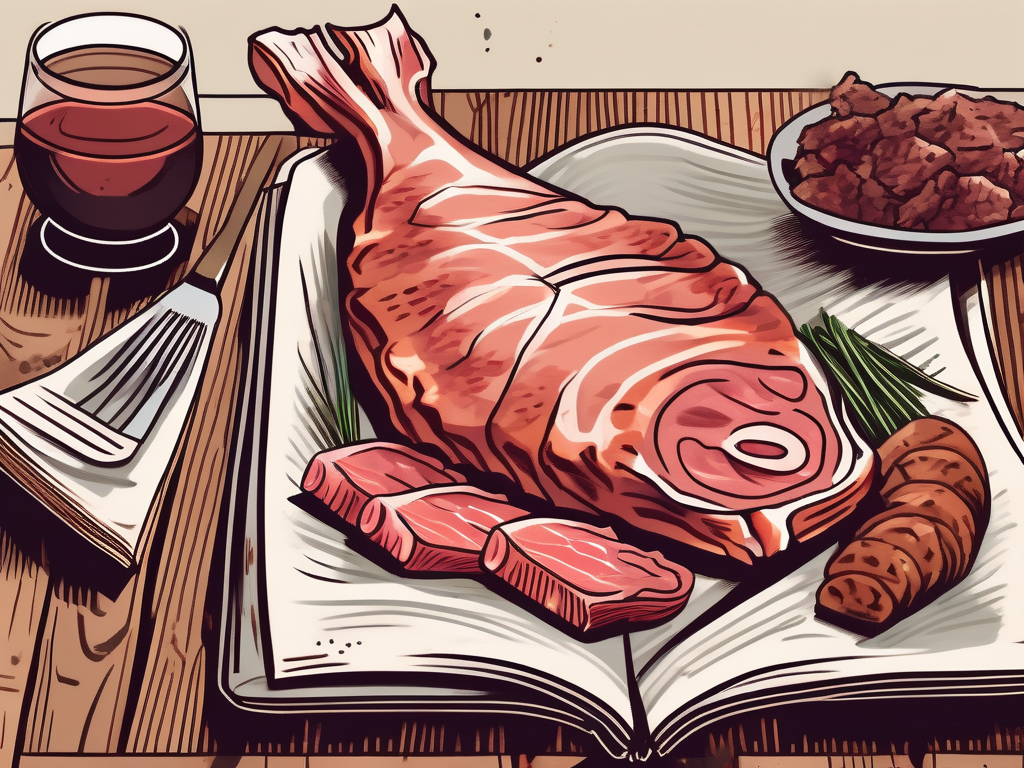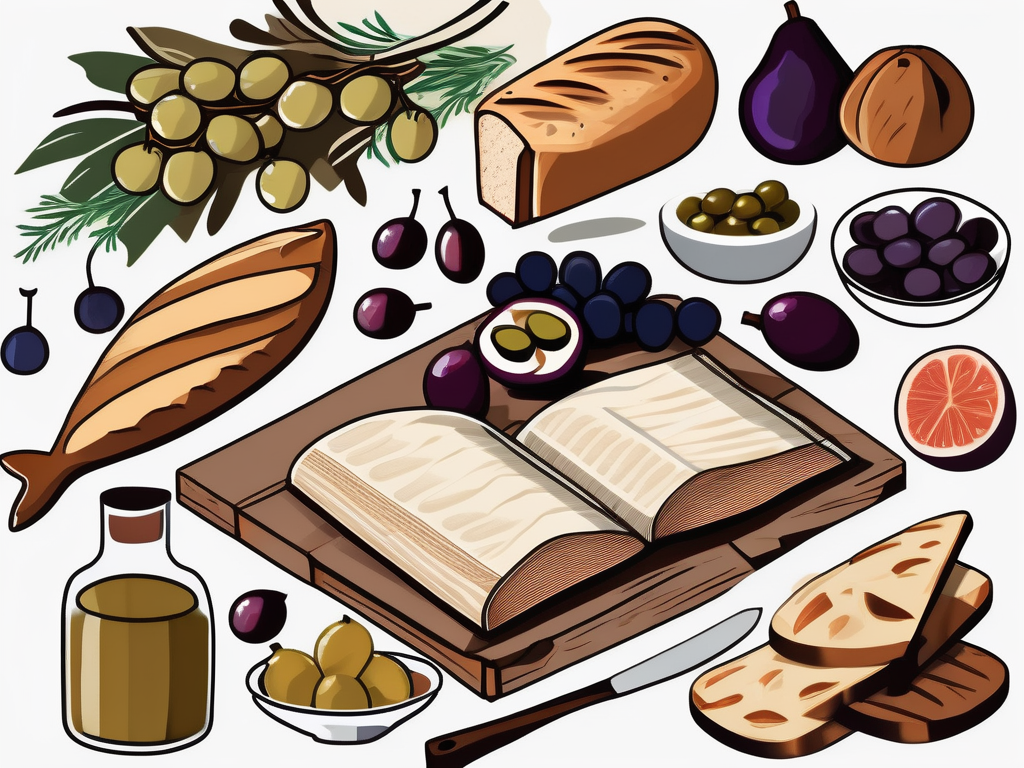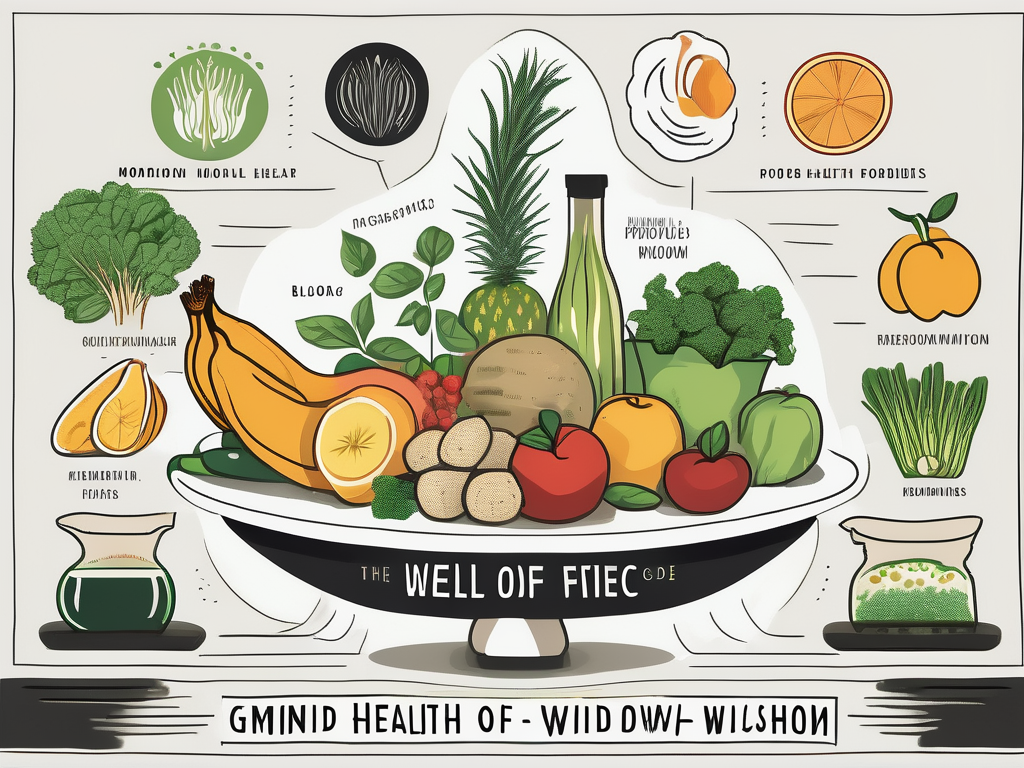Mormon beliefs encompass a wide range of practices, including their unique dietary laws and rituals surrounding food. Understanding these beliefs provides insights into the lifestyle and culture of the Mormon community. In this article, we delve into the basics of Mormon dietary laws, the significance of fasting, the role of food in rituals and celebrations, the concept of clean and unclean foods, the impact on health and lifestyle, and the influence on social and cultural practices. Join us on this fascinating journey as we explore the world of Mormon beliefs on food.
Understanding the Basics of Mormon Dietary Laws
The foundation of Mormon dietary laws is rooted in a revelation known as the Word of Wisdom. This guideline provides Mormons with principles regarding what they should and should not consume. It advises against the use of alcohol, tobacco, and hot beverages containing caffeine. Additionally, it encourages the consumption of wholesome and seasonal foods, while discouraging excessive consumption of meat.
Mormons view these dietary laws as a means to promote physical and spiritual well-being. Abstaining from substances that are considered harmful helps individuals maintain a healthy body and mind, allowing them to better connect with their spiritual selves.
One of the key aspects of Mormon dietary laws is the emphasis on consuming wholesome and seasonal foods. Mormons believe that by eating fresh and natural foods, they are nourishing their bodies in the best possible way. This focus on wholesome foods extends to fruits, vegetables, grains, and herbs, which are seen as essential components of a balanced diet.
Furthermore, the Word of Wisdom advises against the consumption of strong drinks, including alcoholic beverages, as well as tobacco and hot beverages. This guidance is based on the belief that these substances can have detrimental effects on both physical and spiritual well-being. By adhering to these guidelines, Mormons strive to maintain a clean and pure lifestyle.
The Word of Wisdom: A Dietary Guide for Mormons
The Word of Wisdom serves as a dietary guide for practicing Mormons. It encourages the consumption of fruits, vegetables, grains, and herbs, while advocating moderation in the consumption of meat. This guidance stems from the belief that treating the body as a temple requires individuals to nourish it with wholesome foods.
Moreover, the Word of Wisdom also emphasizes the importance of moderation in all things. While meat is not prohibited, excessive consumption is discouraged. Mormons believe that by practicing moderation, they can maintain a balanced and healthy lifestyle.
Additionally, the Word of Wisdom encourages the avoidance of harmful substances such as alcohol, tobacco, and hot beverages containing caffeine. Mormons believe that these substances can impair judgment, hinder spiritual growth, and have negative effects on physical health. By abstaining from them, individuals can maintain clarity of mind and a stronger connection to their spiritual selves.
The Significance of Fasting in Mormonism
Fasting holds great significance in the Mormon faith. Mormons believe that abstaining from food and drink for a specified period, usually 24 hours, helps them draw closer to God. Fasting is practiced on the first Sunday of every month and during special occasions such as religious holidays or personal spiritual needs.
During a fast, Mormons focus on prayer, meditation, and self-reflection. This period of abstinence allows for spiritual renewal and nourishment. It is seen as an act of self-discipline and devotion to God.
In addition to the spiritual benefits, fasting is also believed to have physical and mental health benefits. It provides an opportunity for the body to detoxify and reset, allowing for improved digestion and increased mental clarity. Mormons see fasting as a way to cleanse and purify both the body and the mind.
Furthermore, fasting is often accompanied by acts of charity and service. Mormons believe that by giving to those in need during a fast, they can deepen their connection to God and strengthen their sense of compassion and empathy.
In conclusion, Mormon dietary laws, as outlined in the Word of Wisdom, serve as a guide for Mormons to live a healthy and spiritually fulfilling life. By adhering to these guidelines, Mormons strive to nourish their bodies with wholesome foods, avoid harmful substances, and engage in acts of self-discipline and devotion through fasting. These practices are seen as essential in maintaining physical and spiritual well-being within the Mormon faith.
The Role of Food in Mormon Rituals and Celebrations
Food plays a vital role in various Mormon rituals and celebrations. It serves as a powerful symbol of unity, spirituality, and nourishment within the Mormon community. Two significant events where food holds special meaning are baptism and communion.
Food in Mormon Baptism and Communion
During the baptism ceremony, Mormons participate in a symbolic ritual that involves immersion in water to signify a cleansing of sins. This sacred act is a momentous occasion for individuals as they publicly declare their commitment to their faith. Following the baptism, celebratory meals are often shared with family and friends, reaffirming the individual’s dedication to their religious journey. These post-baptismal feasts not only provide physical sustenance but also serve as a time of joy and fellowship, strengthening the bonds of community.
Similarly, communion, referred to as the Sacrament, is an integral part of Mormon worship services. During this sacred rite, bread and water are distributed to members of the congregation. The bread symbolizes the body of Jesus Christ, while the water represents His blood. By partaking in these elements, Mormons express their unity as followers of Christ and their commitment to living according to His teachings. The act of sharing this symbolic meal fosters a sense of spiritual connection and solidarity among the worshippers.
Mormon Holiday Foods and Their Symbolism
Mormon holidays are celebrated with special foods that hold deep symbolic meaning. These culinary traditions not only add flavor to the festivities but also serve as a way to connect with the core principles of the faith.
For example, during Christmas, a popular dessert called “funeral potatoes” is often served. These cheesy, potato-based dishes represent comfort and nourishment during times of grief or hardship. The name itself may seem unusual, but it reflects the idea that even in the darkest moments, the Mormon community finds solace and strength in their shared beliefs. The act of gathering around a table filled with warm, comforting funeral potatoes reminds individuals of the love and support they have within their religious community.
At Easter, members of the Mormon community may share braided bread, known as “Easter bread,” which symbolizes the resurrection of Jesus Christ. The intricate braiding represents the unity of the body of Christ, while the bread itself signifies the sustenance and eternal life that comes through His sacrifice. This tradition not only brings families and friends together but also connects them to their spiritual beliefs in a tangible way, reminding them of the hope and renewal that Easter represents.
These examples illustrate how food serves as more than just sustenance within the Mormon faith. It is a powerful tool for expressing and reinforcing religious values, fostering community, and creating lasting memories. Whether it is through the shared meals of baptism and communion or the symbolic dishes served during holidays, food plays a significant role in the spiritual and cultural fabric of the Mormon community.
The Concept of Clean and Unclean Foods in Mormonism
Mormons believe in distinguishing between clean and unclean foods. While they do not strictly adhere to the dietary restrictions found in some other religious traditions, they do emphasize the importance of making informed choices regarding food consumption.
In Mormonism, the concept of clean and unclean foods is rooted in the belief that our bodies are sacred and should be treated with respect. Mormons believe that by consuming clean and wholesome foods, they can maintain physical and spiritual well-being.
The Prohibition of Alcohol, Tobacco, and Caffeine
One of the key principles of the Mormon faith is abstaining from alcohol, tobacco, and hot beverages containing caffeine. This practice reflects their commitment to maintaining a healthy lifestyle and avoiding substances that may hinder spiritual clarity.
By avoiding these substances, Mormons believe they can better align themselves with their spiritual goals and live a life of self-control and discipline. This commitment to abstaining from harmful substances extends to their dietary choices as well.
The Emphasis on Wholesome and Seasonal Foods
While Mormons do not have specific dietary restrictions on clean and unclean animals, they place emphasis on the consumption of wholesome and seasonal foods. This encourages individuals to embrace a balanced diet and appreciate the natural cycles of food production.
Mormons believe that by consuming foods that are in season, they can connect more closely with the earth and its abundance. This practice also promotes sustainability and reduces the environmental impact of food production.
By focusing on the quality and origin of their food, Mormons strive to cultivate gratitude, mindfulness, and responsibility towards the blessings of nourishment provided by a loving Heavenly Father. They believe that by making conscious choices about what they eat, they can show gratitude for the abundance of resources available to them and develop a deeper appreciation for the interconnectedness of all living beings.
In conclusion, the concept of clean and unclean foods in Mormonism goes beyond mere dietary restrictions. It is a holistic approach to food consumption that encompasses physical, spiritual, and environmental well-being. By abstaining from harmful substances and embracing wholesome and seasonal foods, Mormons aim to nourish their bodies and souls while fostering a deeper connection with the divine and the natural world.
The Impact of Mormon Food Beliefs on Health and Lifestyle
Mormon dietary laws have a direct impact on the health and lifestyle choices of individuals within the community. By abstaining from harmful substances and adopting a wholesome diet, Mormons aim to lead healthier lives physically, mentally, and spiritually.
The Mormon faith places great importance on the concept of stewardship, which includes taking care of one’s body as a sacred gift from God. This belief is reflected in their dietary practices, which promote the consumption of foods that are considered clean and pure. The focus is on nourishing the body and treating it as a temple.
One of the key principles of the Mormon diet is abstaining from alcohol and tobacco. Research suggests that these substances can have detrimental effects on health, including an increased risk of various cancers, liver disease, and addiction. By avoiding these harmful substances, Mormons are making a conscious choice to protect their bodies from these potential dangers.
The Benefits of a Mormon Diet
Research suggests that adhering to the principles of Mormon dietary laws, such as abstaining from alcohol and tobacco, and consuming wholesome foods, can have positive effects on overall health. These practices may reduce the risk of chronic diseases, promote healthy weight management, and improve mental well-being.
By focusing on wholesome foods, such as fruits, vegetables, whole grains, and lean proteins, Mormons are able to provide their bodies with essential nutrients. This nutrient-rich diet can support optimal physical health, providing the body with the energy and resources it needs to function at its best.
Furthermore, the emphasis on moderation and discipline encourages individuals to develop a balanced approach to eating, leading to healthier relationships with food. Rather than indulging in excessive amounts of unhealthy foods, Mormons are encouraged to practice self-control and make choices that align with their beliefs and values.
Challenges and Criticisms of the Mormon Dietary Laws
While some value the strictness of Mormon dietary laws, others may find them challenging to adhere to in the modern world. The prohibition of alcohol, tobacco, and caffeine can be a contentious issue for individuals seeking to reconcile their faith with societal norms.
In a world where social gatherings often revolve around alcohol consumption, Mormons may face challenges in finding alternative ways to socialize while adhering to their dietary restrictions. However, many find creative solutions, such as hosting alcohol-free events or participating in activities that do not involve substances that are prohibited by their faith.
Additionally, critics may argue that the emphasis on specific dietary guidelines can lead to feelings of guilt or judgment among those who struggle to meet these standards or have different beliefs about what constitutes a healthy lifestyle. It is important to recognize that everyone’s journey towards health and well-being is unique, and individuals should be supported in finding a balance that works for them.
Despite the challenges and criticisms, the Mormon dietary laws continue to play a significant role in shaping the health and lifestyle choices of individuals within the community. By adhering to these principles, Mormons strive to live in harmony with their faith and promote overall well-being.
The Influence of Mormon Food Beliefs on Social and Cultural Practices
Mormon beliefs about food extend beyond individual choices and have a significant impact on social and cultural practices within the community.
Mormon Food Storage and Self-Sufficiency Practices
Mormons believe in being self-reliant and prepared for difficult times. As such, food storage is an important aspect of Mormon culture. Many Mormons maintain reserves of non-perishable and staple foods to ensure they can sustain themselves and provide for others in times of need or emergencies.
This practice reflects the community’s commitment to caring for one another and being prepared to weather challenges together.
The Role of Food in Mormon Missionary Work
Mormon missionaries dedicate themselves to spreading their faith and serving others. While on their missions, missionaries often participate in communal meals with local members or prospective converts. These shared meals not only provide sustenance but also create opportunities for connection and fellowship.
Food forms a bond between the missionaries and the communities they serve, fostering understanding and strengthening relationships.
In conclusion, the Mormon beliefs surrounding food and dietary practices offer a fascinating glimpse into their values, lifestyle, and cultural traditions. Through the Word of Wisdom, fasting rituals, symbolism in ceremonies and celebrations, the concept of clean and unclean foods, health considerations, and communal practices, food plays an integral role in the Mormon community. By understanding and appreciating these beliefs, we gain insight into the broader tapestry of Mormon culture and their unique approach to nourishing the body and soul.












